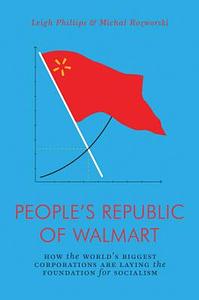Take a photo of a barcode or cover
slow-paced
informative
medium-paced
An interesting read into how planning within companies, between companies, and between industries has happened and could happen. Needs a good bit of baseline information to grasp concepts and some sections can be very dry. I didn’t particularly care for the classic and shallow SocDem anti-Stalin anti-Soviet views, but the commentary against overly authoritarian planning was insightful even if it is largely still anti-communist.
This book hugely inspirational at times when describing what a better world could look like and how humans could thrive using the materials we currently have.
It goes into Walmarts internally planned system that is larger than the economies of whole countries; how Sears basically died out because of an introduced internal market between divisions; a contradiction of big data collection for human good but also potential and current human oppression; how nationalizing industries is a necessary starter to decommodify parts of the economy, but also not sufficient itself; how planning is best done when democratized to its fullest extent; how the marriage of political-economy and hard mathematics will be necessary for democratic planning and can symbiotically drive each other forward; how Allende’s CyberSyn project was incredibly successful combatting a capital strike and potentially powerful for a wider economy of consumer goods yet crushed but reactionaries funded and backed by the CIA; and how democratic planning when liberated from the profit motive can build the Good Anthropocene where humans and the planet flourish.
This book hugely inspirational at times when describing what a better world could look like and how humans could thrive using the materials we currently have.
It goes into Walmarts internally planned system that is larger than the economies of whole countries; how Sears basically died out because of an introduced internal market between divisions; a contradiction of big data collection for human good but also potential and current human oppression; how nationalizing industries is a necessary starter to decommodify parts of the economy, but also not sufficient itself; how planning is best done when democratized to its fullest extent; how the marriage of political-economy and hard mathematics will be necessary for democratic planning and can symbiotically drive each other forward; how Allende’s CyberSyn project was incredibly successful combatting a capital strike and potentially powerful for a wider economy of consumer goods yet crushed but reactionaries funded and backed by the CIA; and how democratic planning when liberated from the profit motive can build the Good Anthropocene where humans and the planet flourish.
informative
fast-paced
informative
inspiring
reflective
medium-paced
The first chapters of the book are very interesting. But the chapters about the Soviet Union are like Hollywood movies about Russia - wild and stupid Russians magically built the strongest economy in the world. Stalin, as always, killed everyone, so who built this economy is unclear...Treat these chapters with caution, they resemble the propaganda of the Cold War.
not as prescriptive as i expected it to be. lots of interesting context addressing the political and social feasibility of a planned economy, but did the authors really expect ME, CHRISTIAN, a stupid dumbass, to draw MY OWN conclusions about the practical application of these historical examples? awfully presumptuous of them to assume I would be capable of that. good book.
challenging
informative
reflective
medium-paced
I think the book's general premise is compelling to analyze and explore.
However, I think latter half of the book is significantly weaker as gone are much economic analyses. This is especially so when the author speaks of the Soviet Union, which repeatedly brings up authoritarianism and tyranny. I would at least be willing to hear the author out much more if they could provide economic data suggesting this is the case.
As a result the second half of the book reads more like a polemic against the USSR than any serious discussion regarding it's failures in economic planning.
However, I think latter half of the book is significantly weaker as gone are much economic analyses. This is especially so when the author speaks of the Soviet Union, which repeatedly brings up authoritarianism and tyranny. I would at least be willing to hear the author out much more if they could provide economic data suggesting this is the case.
As a result the second half of the book reads more like a polemic against the USSR than any serious discussion regarding it's failures in economic planning.
challenging
informative
slow-paced
fast-paced
I was primed to hate this book based on the other Verso/Jacobin books I read recently, but this was a nice change of pace. I have qualms with how it defines "planned" economies, but on the whole the book is a good introduction to industrial economies and macroeconomics. It gives you a wide breadth of approaches to economic structures with a lot of opportunities to fall into Wikipedia holes. May come back later and edit with full thoughts.






